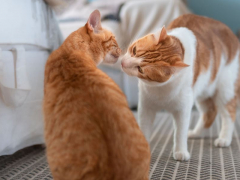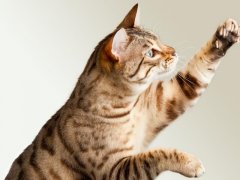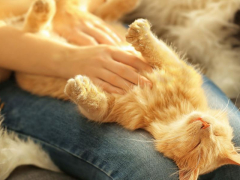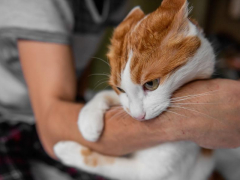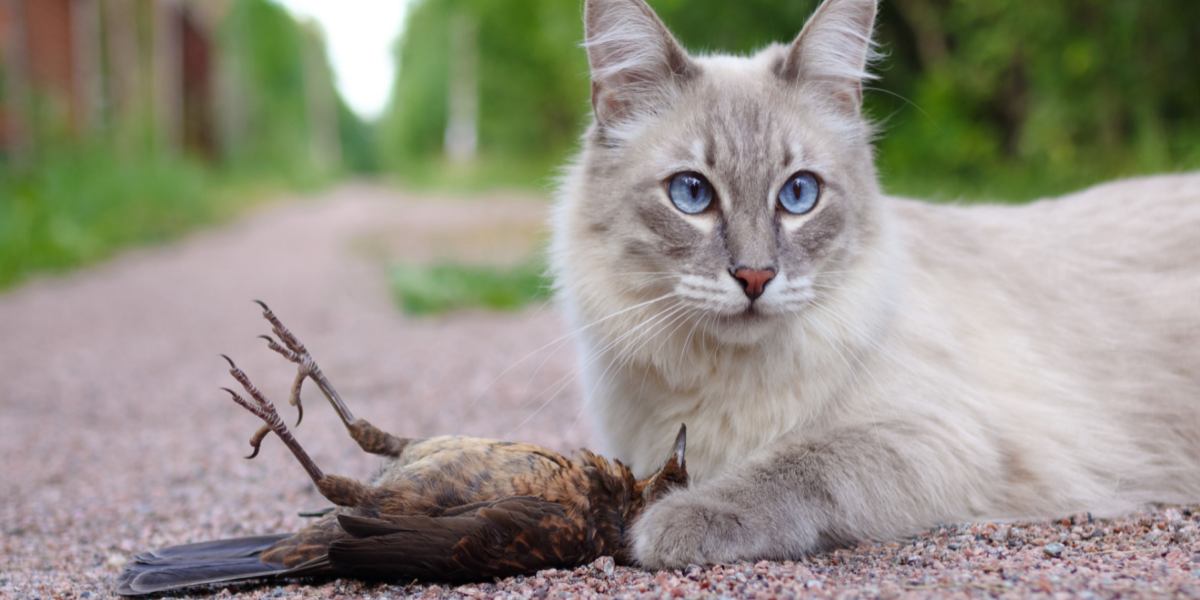
If you own a young, active cat with access to the outdoors, you may have witnessed the grisly sight of your precious feline hunting down their prey, be it a bird, mouse, vole, or other small critter. You may even have been subjected to that highest of compliments from your furry friend: a “present” of their catch, either alive or dead, deposited at your feet.
Are you despairing about why your cat is out hunting despite the wonderfully tasty and nutritious meals you provide for them? Worried that their strange behavior of playing with their prey says something bad about their character? Worry not, this is all perfectly normal.
Read on for more information about cats, hunting, and play.
Why Do Cats Hunt?
The domestic cats we know and share our homes with today are descended from wild cats. These cats, similar to the feral cats still around today, did not have the luxury of cat food provided for them by their loving owners.
They had strong survival instincts, meaning that their natural instinct led them to display good hunting skills around prey animals. Those cats who failed at adequate hunting behavior would starve. As with most cat behavior, kittens learn skills like this from the mother cat, alongside their littermates.
Pet cats today rely instead upon their doting cat owners to provide food, either kibble or wet food. However, those natural instincts are still very strong, causing our cats to still have a strong desire to hunt prey, even if they do not need to do so nutritionally.
Most adult cats will show some form of predatory behavior if they see small animals or even cat toys that resemble small critters.
Why Do Cats Play With Their Prey?
It’s one thing to rely on hunting behaviors to survive, but toying with the catch before eating it (or worse, not even eating it at all!) seems a bit, well … mean! So, are our feline friends naturally cruel, or is there another reason for this common cat behavior?
There are several reasons why your cat may be playing around with their prey.
1. Hunting Instincts
In the wild, cats play with their prey before administering the last fatal bite through the spinal cord in a deliberate attempt to tire the prey animal out. If the small animal or bird is tired, they are less likely to cause injury to the cat via teeth, beak, or claws when they go to finally kill it.
This is natural predatory behavior seen in many species, including large cats—the big cousins of our house cats.
2. Practice
Practice makes perfect, and most cats will take any opportunity to sharpen their hunting skills. This is especially true of indoor cats and those who do not have much opportunity to play or hunt.
Cats love to mimic hunting behavior through play: pouncing, chasing, grabbing, and biting. Once they have successfully caught their prey, they may indulge in some extra play such as pouncing on the poor critters repeatedly, all in the name of perfection.
3. Opportunistic Hunters
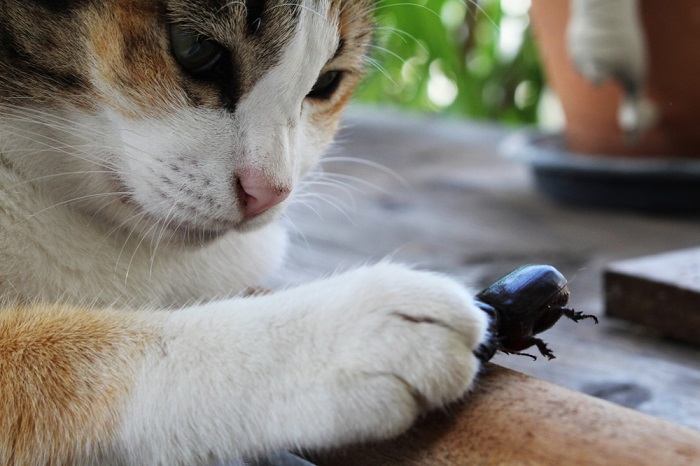
Cats aren’t being mean when they play with their prey, they’re just exercising their instincts.
If your cat is not actually hungry—due to recently eating a delicious bowlful of kibble for example—they may not be able to resist pouncing on, and catching a small animal, but not want to eat it.
If they catch prey but are not hungry, they may keep the dead prey for later, or they may just use the catch as a play session. Not hugely commendable, but that’s cats for you!
Why Do Cats Bring Live Prey Into the House?
Ahh, the “gift” of a bird or mouse, how delightful. Cats perform this wonderful ceremony of bringing their prey home because they are territorial. Their territory tends to be split into a core “safe zone” where they rest and eat, and a larger peripheral area where they patrol and hunt.
Many cats will hunt out in their peripheral territory but prefer to return to their inner sanctum to feed—usually your house. Cats are solitary hunters, they do not hunt in groups or packs, but they are social eaters—they return to the colony or group to eat. It is good manners in the feline world to bring food back to their social group to share.
Can I Stop My Cat From Hunting?
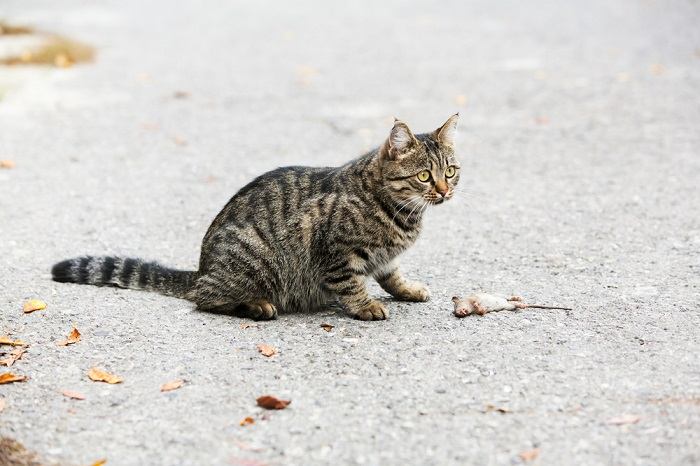
Cats have strong predatory instincts, but not all cat owner want their cats to hunt.
A common question among cat owners, this is a bit of a tricky one. Cats have strong predatory instincts; hunting is a very natural cat behavior.
However, many cat owners are uncomfortable with their cat hunting and killing small animals, and certainly don’t appreciate their pet cats bringing a dead animal home!
Here are some things to consider if your cat is a voracious hunter.
1. Consider Moving to an Indoor Lifestyle
If you want to absolutely remove the risk of hunting, then consider keeping your cat indoors unless supervised, or build your kitty a catio or similar safe outside area. Remember to provide plenty of toys, puzzles and other enrichment to keep your cat mentally and physically stimulated to prevent boredom and frustration.
2. Recognize the Danger Periods
If you’re looking for a balance between a complete outdoors ban and reducing prey, think about timed access to the outdoors. Most cats hunt at times of dawn and dusk. They are crepuscular, meaning that they are most active at these times. Birds and small mammals are also more around at these times. Keeping your cat inside at these key times can reduce hunting.
3. Re-Direct Their Hunting Instinct
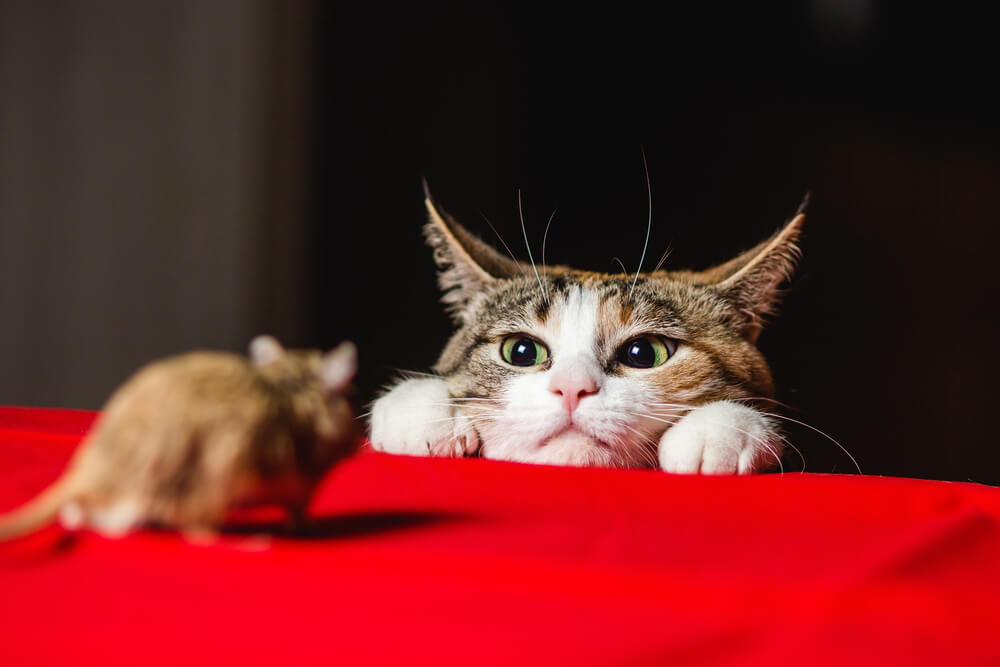
Many cats hunt in their peripheral territory but prefer to return to their inner sanctum—the house—to feed.
Cats love to play, and as well as being an excellent way to bond with your pet, playtime also expends excess energy, provides mental and physical stimulation, and fulfils that innate need to chase, pounce, and bite. Lots of active play can help to reduce hunting behavior.
4. A Bell Collar
Collars with a bell attached are an effective way of reducing your cat’s ability to catch prey whilst still allowing them to practice predatory behaviors. Make sure the collar has a safety feature to allow quick release if they get caught on anything.
5. Think About Food
Your cat may be hunting because they are hungry. Try feeding a high-quality nutritious diet in small frequent feeds throughout the day. Puzzle feeders can be a good way of keeping your cat satisfied physically but also provide some mental stimulation.
Conclusion
Cats are natural hunters, and catching prey is a hugely important part of normal cat behavior, although some are much more prolific than others. Cats often play with their food before they eat it, either because they are making sure the prey is weakened before getting in close for the kill, or because they are hunting for practice rather than due to true hunger.
If you would like to reduce your cat’s killer instincts, there are some methods you can use to decrease hunting behavior whilst still maintaining normal cat behavior.
Also Read: How To Clean Your Cat’s Litter Box According to a Cat Behaviorist
